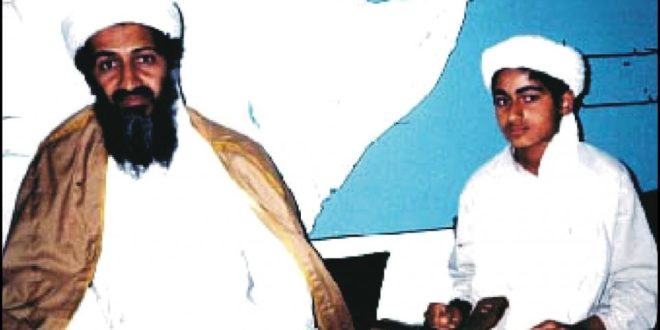Shehab Al-Makahleh
Hamza bin Laden, the son of Osama bin Laden, appeared in a video broadcast by al-Qaeda’s ‘al-Sahab’ media channel in which he criticized Saudi Arabia and its alliance with the United States. This video raises many questions about the timing, the motives and future developments, as Hamza may be in the process of being groomed for a senior role.
Hamza bin Laden seems to be emerging in circumstances similar to those in which his father came to prominence, following the invasion of Kuwait in 1990 after he escaped from house arrest in Saudi Arabia and reached Sudan to raise ‘Arab Mujahideen’ for his new terrorist group later known as al-Qaeda.
Hamza bin Laden, who the American security authorities have designated a ‘global terrorist’ in January 2017, would succeed his father and has already become the poster boy for the terror network’s media campaigns and propaganda.
Chip off the old block
He was the closest to his father and to al-Qaeda’s ideology among his other siblings. Hamza followed Osama in many of his tours and movements. Born in 1989, he represents the new generation of al-Qaeda.
The broadcast of Hamza’s video is not for the sake of local consumption among the group’s members, but conveys a message to the world and mainly to the West that al-Qaeda is making a comeback. The young bin Laden is regarded by many experts as the figure who could potentially reunite the global jihadist movement.
The nature of the ideological concepts adopted by Hamza bin Laden is still not clear, whether it is identical to his father’s convictions and beliefs or not. It is important to note that al-Qaeda does not believe in fomenting sectarian wars but is mainly in war against Muslim regimes ostensibly for the sake of Islam.
As Hamza grew up in Sudan and Afghanistan, where Osama was given refuge by the Taliban, he often appeared in propaganda videos with his father when he was still a child. The recent video sends out the message that al-Qaeda will act harshly against Western targets around the world, mainly in the Middle East, especially after the US President Donald Trump recognized Jerusalem as capital of Israel.
Few years ago, Hamza tried to enter Pakistan to reunite with his father in the battlefield: “What truly makes me sad is that Mujahideen legions have marched and I have not joined them”. This is an indication that the young man was very keen on joining the group and on leading them to achieve what his father sought.
The ‘lone wolf’ threat
In 2015, al-Qaeda aired an audiotape of Hamza in which he lauded the Boston Marathon bombing, and called on supporters to take to the “battlefield from Kabul, Baghdad, and Gaza to Washington, London, Paris, and Tel Aviv”. This time he also called his on followers to take to the battlefield that would serve al-Qaeda’s interests.
Since Osama bin Laden’s death in May 2011, al-Qaida has remained in the wilderness. The war against terrorism over the past few years in Iraq and Syria has given al-Qaeda in Afghanistan the chance to rebuild its capacities.
As ISIS’ political project of building an ‘Islamic Caliphate’ and of overthrowing regimes in the Middle East failed, al-Qaeda took the initiative to regroup and may accept erstwhile ISIS members into its ranks. As ISIS adopted some techniques of warfare from al-Qaeda; the latter has also benefited from the mistakes of ISIS’ tactics, which al-Qaeda will avoid in the coming period.
The appearance of Hamza bin Laden is not a mere coincidence, but a confirmation of his rise as leader of the group. A new chapter may commence with a new phase in lone wolf attacks in the West especially on occasions like the New Year and Christmas. The new targets of al-Qaeda may also be Arab countries, which it may seek to destabilize and overthrow its governments. How the world would stand up to this new challenge remains to be seen.
___________
Shehab Al-Makahleh is Director of Geostrategic Media Center, senior media and political analyst in the Middle East, adviser to many international consultancies. He can be reached at: @shehabmakahleh and @Geostrat_ME
Originally published by Al-Arabiya
 Geostrategic Media Political Commentary, Analysis, Security, Defense
Geostrategic Media Political Commentary, Analysis, Security, Defense





